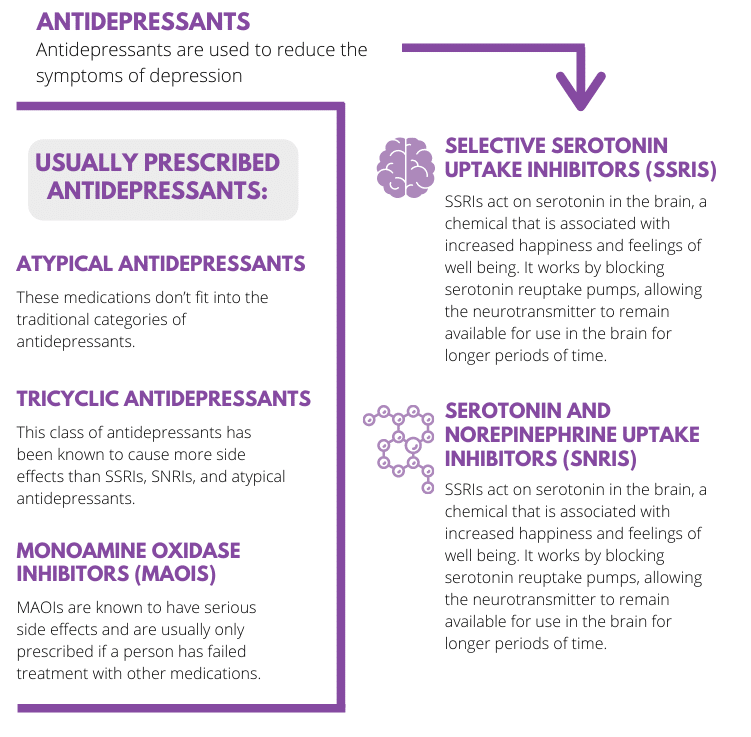Mixing alcohol with antidepressants can be dangerous, leading to serious side effects and potential health risks. Antidepressants are commonly prescribed to treat depression, anxiety, and post-traumatic stress disorder. While they can effectively manage these conditions, they can also interact with other substances, including alcohol. When taken together, the combination can amplify the effects of both substances, leading to drowsiness, dizziness, and even confusion. It can also lead to respiratory problems, coma, or even death in severe cases. It is essential for individuals who are taking antidepressants to understand the potential risks associated with mixing these medications with alcohol. They should always speak with their healthcare provider about their situation’s best course of action.
Table of Contents
ToggleWhat are Antidepressants?
Antidepressants are used to reduce the symptoms of depression. There are many different types of depression-reducing medications, and each works through a unique mechanism. The antidepressant a doctor recommends depends on a person’s symptoms and how severe they are.

Selective Serotonin Uptake Inhibitors (SSRIs)
SSRIs are generally the go-to prescription for someone taking an antidepressant for the first time. This is because they tend to have the least side effects at higher doses.[1] As the name suggests, SSRIs act on serotonin in the brain, a chemical associated with increased happiness and well-being. It works by blocking serotonin reuptake pumps, allowing the neurotransmitter to remain available for use in the brain for longer periods. [2] Common SSRIs include:
- Prozac
- Zoloft
- Lexapro
Serotonin and Norepinephrine Uptake Inhibitors (SNRIs)
SNRIs work through a similar mechanism of action as SSRIs, except they also have the added ability to block the reuptake of norepinephrine. Norepinephrine is the adrenaline hormone, which increases activity in the central nervous system. These drugs also have fewer side effects compared to other classes of antidepressants.[3] They include:
- Effexor
- Cymbalta
- Pristiq
Atypical Antidepressants
These medications don’t fit into the traditional categories of antidepressants. They have varying levels of different side effects.[1] Drugs in the category are:
- Wellbutrin
- Remeron
- Trintellix
Tricyclic Antidepressants
This class of antidepressants has been known to cause more side effects than SSRIs, SNRIs, and atypical antidepressants. Because of this, doctors generally don’t prescribe these drugs unless a person has not responded to treatment with the other ones.[1] These medications include:
- Tofranil
- Pamelor
- Norpramin
Monoamine Oxidase Inhibitors (MAOIs)
MAOIs are known to have serious side effects and are usually only prescribed if a person has failed treatment with other medications. When someone is taking an MAOI, they need to be on a restricted diet due to potential interactions with certain types of alcohol, cheeses, and pickles. They also have adverse interactions with other medications. Common MAOIs are:
- Parnate
- Nardil
- Marplan
How do Antidepressants and Alcohol Interact?
Mixing antidepressants and alcohol is generally counterproductive. This is because alcohol works to interfere with antidepressants and causes several problems. As a depressant, it significantly worsens depression and anxiety. It also makes some unpleasant side effects of antidepressants worse.[4] These side effects include:
- Impaired cognition
- Drowsiness
- Slowed motor skills
- Increased depression and anxiety
Drinking alcohol may also cause life-threatening interactions with certain antidepressants, namely MAOIs. [4] However, with SSRIs and SNRIs, drinking is acceptable when limited to very small amounts. If a person is considering stopping an antidepressant because they want to be able to drink more, this is a common sign of alcoholism.
Depression and Alcohol Abuse
People suffering from depression are at an increased risk of developing alcohol use disorder, which makes mixing alcohol and antidepressants even more dangerous. Many people with depression also experience disrupted sleep patterns and difficulty sleeping. Alcohol acts as a sedative, which is commonly abused as a sleep aid. However, many people do not know that alcohol disrupts sleep, making it less restful.[5]
Another common reason individuals with depression develop alcoholism is that they will drink as a form of self-medication to try to improve the symptoms of their depression. It’s true that alcohol temporarily increases pleasurable feelings and reduces anxiety. However, when someone becomes a chronic drinker, depression and anxiety are eventually exacerbated to much worse levels than before they started drinking. For this reason, depression is no excuse for alcohol abuse.
Seeking Help for Depression and Alcohol Alcoholism
If you or a loved one suffers from depression and alcoholism, it is important to seek help as soon as possible. Treatment for both depression and alcohol addiction includes cognitive and behavioral therapy. Therapy works by teaching coping mechanisms on how to deal with symptoms of depression healthily while also addressing the underlying causes of alcohol addiction.
We address mental health and addiction at Agape Treatment Center in Fort Lauderdale, Florida. Our licensed counselors tailor a plan that fits your mental health, and addiction needs to provide you with the best care possible. If you’re suffering from depression and have been mixing antidepressants with alcohol, contact us today. We are here to help.







